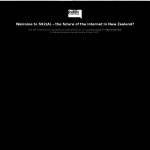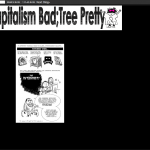Chris Trotter seems to think I’m being culturally precious and pandering to MÄori separatism with my post on the h issue. He misses the point, and fearmongers about vague Orewa-like shadows of a savage threat to the settler way of life.
While it did a lot of describing, the purpose of the post was not descriptive, (is) but normative (ought). The question was not whether Wanganui has become the de facto and de jure name of the town; it manifestly has, a fact I acknowledge by using that spelling throughout that post and this one.* The question was whether those who made it so had the right to make it so, and whether they have the right to keep it so against the will of those who retain rights to the name and its usage – rights granted in principle (but not necessarily enforceable in law) by the Treaty of Waitangi.
Chris seeks to derail this by reference to the changing nature of language, but his example hardly addresses the point, far from invalidating it. The `ought’ I’m arguing is that those with a legitimate historical, linguistic and cultural claim to a name – nobody disputes that they do – which forms a core aspect of their whakapapa and regional identity and who have been actively working to maintain that name for generations should not have that claim summarily invalidated by the whim of a majority whose sole attachment to the word is the ignorance of colonial hegemony – wanting to control whatever aspect of the local culture they can for fear of their own insecure identity. The Bowalley Road example, while interesting, is fundamentally different from the case in point for two reasons: first, it is a name which was attached to a place by individual fiat rather than from long-established common usage; and second, nobody seems to care that it has been changed. My argument rests firmly on both these considerations, and they lend it legitimacy: if it were a made-up name, and if nobody cared, my claim would clearly be invalid. The proponents of retaining the current spelling also appeal to both these grounds for legitimacy, so the question is not which of the two causes is legitimate – it is which of the two spellings should take primacy over the other. Who gets to exercise cultural control – rangatiratanga – over the name? Its originators, whose regional and whakapapa identity is tied to in it, at whose pleasure the original PÄkehÄ settlement was founded, and who have since been systematically excluded from its affairs to the point where they are now outsiders on their own historical lands; or the settlers, whose cultural and linguistic dominance is already evident in myriad ways, who are responsible for the marginalisation of the tangata whenua, and who fight tooth and nail against every attempt at reconciliation or reparation unless it is on their terms and their terms alone. The two claims to primacy have the same grounds in principle – it’s just that the grounds of one are stronger than the grounds of the other.
The second part of Chris’ article is worse, though, because rather than misunderstanding the point and its arguments, he misstates the cause and repeats a divisive propaganda line about the dangers of allowing the natives to exercise any authority. Although Chris might not agree, this kite about the MÄori radicals in the closet just waiting for their moment to disrupt the nice harmonious race relations we have in NZ is not too dissimilar from that flown by Don Brash five years ago at the Orewa Rotary Club. Let me deal with the two paragraphs in turn:
What’s more, Ken Mair’s demand that the pre-colonial appellation be restored is, I strongly suspect, part-and-parcel of a much more ambitious plan to reclaim his people’s sovereignty over the entire region. To do that, however, Ken and his people would have to fight the colonial wars of conquest all over again – this time emerging as the winners.
Why didn’t we see through their nefarious plan?
1. Change the name.
2. ?????
3. Declare the Mairist Republic of Whanganui.
4. Profit!
The assertion is beyond preposterous; comparing it to the Underpants Gnome business model almost does the model a disservice.
The goals of tino rangatiratanga ceased to be cession/secession, revolution and mass reoccupation by force generations ago. Tangata whenua – and particularly those of the Whanganui region – have embraced the legitimate governmental and judicial processes at their disposal, so much so that one of their daughters is a minister in the current government.
So perhaps the “grasping settlers” Lew condemns are smarter than he is willing to admit. Perhaps they see right through Ken’s seemingly harmless demand that the spelling of the city’s name be changed. Perhaps, by resisting this little challenge today, the Wanganui District Council and its Mayor can avoid resisting much more dangerous challenges tomorrow.
I never condemned the settlers as stupid – I freely admit that they’re not; they have very smartly and efficiently suppressed almost all MÄori resistance, to their great advantage. I condemned their actions and attitudes as unjust and counterproductive in the long term. Chris’ whole argument here begs the question that there’s a race war on, and this is the fundamental assertion that the logic of Orewa and of the iwi/kiwi billboards and of the underclass and the warrior gene expects us to accept – for without it, the edifice crumbles. The entire assumption rises from that same grasping settler mentality I identified – fear of the other, fear of scarcity, fear of losing control, the constant feeling of being embattled and under siege and somehow insecure.
If one accepts – and there is copious evidence for this – that there is no intractable race war, and MÄori no longer want to fight, but to retain rangatiratanga over the things they still have, and gain control – mostly symbolic, rather than material – over a tiny fraction of what they lost, there’s no argument to be had here. Work with them, rather than against them, treat in good faith and look to the future, and the future begins to look a whole lot brighter.
Today, 28 February, is the anniversary of the 1995 occupation of Pakaitore, the grounds upon which the Wanganui District Courthouse stands, known formerly as Moutoa Gardens in honour of the `loyal MÄoris’ who defended the settlement against a Hauhau assault at Moutoa Island in 1864. The occupation lasted nearly three tense months during which the settlers thought their town had been invaded – my wife’s cousin phoned from London in the middle of the night to make sure she wasn’t in any danger; of course, she wasn’t because there was no violence beyond the usual which happened between the Rutland and Commercial Hotels. The occupation centred upon the claim that the land had been expropriated by the city, not sold by tangata whenua. On this same day in 2007, the MÄori Land Court returned the block to iwi, who now receive a rental from the Ministry of Justice, whose courthouse continues to operate undisturbed. The land remains publicly accessible to all, although the statue of John Ballance no longer stands. Today, in the wind and rain, there were tents set up selling fry bread and hÄngi and raw fish and home-grown veges and artwork; people standing around talking and kids playing. Ken Mair was there; he doesn’t know me and I’m just about as white as can be, but he greeted me warmly and bid me welcome and we chatted for a moment. There was a big tino rangatiratanga flag, but no chest-thumping or politicking or nationalistic fervour – it was a marketplace, on the site of a historical marketplace. The only problem was that there were hardly any white folk there, and those who were there looked guilty and suspicious, like they thought they were trespassing. The people selling the raw fish were embarrassed that they had trouble producing change for a $20 note. A girl of about seven wanted to know where I was from, and when I told her `Wellington, but I grew up here’, she asked `why don’t you live in Wanganui any more?’ What’s needed, and wanted, is more understanding, not the entrenchment of colonial ignorance or its endorsement as a valid way of life.
So, Chris, beyond the vague shadows of Orewa, what `dangerous challenges’ might the latter-day settlers of New Zealand face if they allow tangata whenua a bit of symbolic and linguistic authority over their own names and history?
L
* I use the spelling `Wanganui’ because this spelling currently has primacy. While I believe the spelling should be `Whanganui’, it’s not good enough to just have it become the de facto spelling. In order to recognise rangatiratanga, it must be made official – ariki ki te ariki, tangata ki te tangata.










